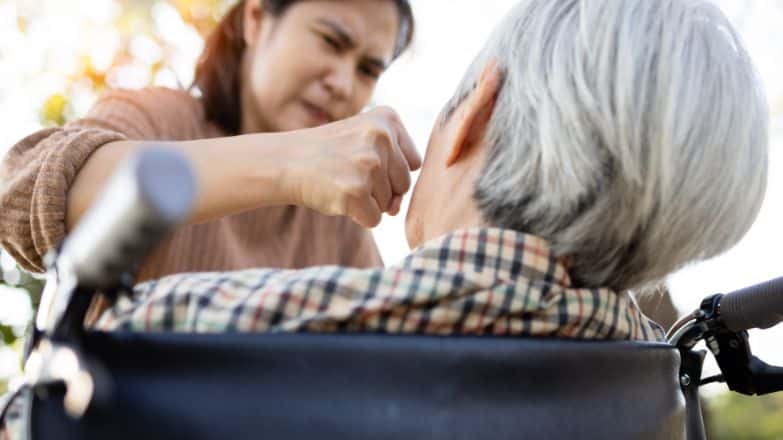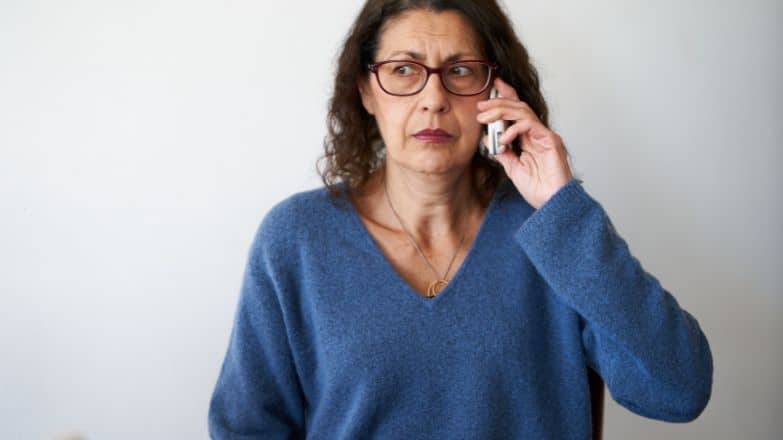Age-related problems such as elderly abuse affect the ability and lifestyle of individuals in today's world and can lead to a decline in social support. Increasing ageing population requires adequate support. This 10-minute reading can help anyone who has an adult needs protection from the dangers of those who have the responsibility to protect their health. They need it all. About a fifth of those in their 50s or 60s are affected by domestic violence, including mistreatment abuse neglect and exploitation, the CDC estimates.
What does elder abuse look like?
The abuse of older and vulnerable adults is not unique. This is a complex issue that may stem from numerous causes, including past violence, social and family ties, misunderstandings within a household and lifestyle change, and tension that might arise in new life arrangements. Those with underlying medical issues may experience abuse by a senior citizen. Various social attitudes may cause violence in older people and help prevent abuse from happening without identifying.
Why Does Elder Neglect Occur?
Neglect is a generally widespread type of elder abuse due to the high prevalence of medical conditions that make older people vulnerable to neglect. The neglect is usually intentional if one parent has chosen to withhold food or medicine. It's possible to leave caregivers unintentionally — when neglect occurs those caregivers may have been able to provide help to aging patients but are too weak to provide help.
Types of elder abuse
Elderly abuse encompasses various forms of mistreatment, with financial abuse, sexual abuse, physical abuse, and emotional or psychological abuse being prominent concerns.
Financial elder abuse occurs when an older person's monetary resources are misused or exploited by individuals who may be family members, caregivers or strangers preying on vulnerability. Instances can range from theft and fraud to coercing the victim into signing documents unknowingly.
Sexual elder abuse involves non-consensual acts forced upon elderly persons, often perpetrated by acquaintances or even staff within care facilities. This heinous violation undermines dignity and autonomy while inflicting profound trauma on victims already grappling with vulnerabilities associated with aging.
Physical elder abuse manifests as deliberate harm inflicted upon elders through actions comprising hitting, pushing, burning or restraining them improperly. The distressing consequences include injuries ranging from bruises to broken bones and a decline in overall health outcomes.
Emotional or psychological elder abuse refers to behaviours aimed at demeaning, intimidating or manipulating senior citizens mentally and emotionally—this could involve ridicule, threats of abandonment, humiliation or ignoring their basic needs repeatedly over time.
Such maltreatment not only causes immediate anguish but also contributes to long-lasting effects on mental well-being leading to anxiety disorders such as depression among elderly individuals unfortunate enough to experience it first hand.

Physical elder abuse
Physical elder abuse refers to the distressing mistreatment inflicted upon an older adult by their own family members or trusted individuals, thereby betraying the fundamental bonds of trust and care inherent in familial relationships.
This highly concerning form of physical abuse encompasses a range of intentional acts such as hitting, slapping, pushing, or even imposing physical restraints on vulnerable seniors who depend on them for support and compassion. The insidious nature of physical elder abuse demands prompt action from healthcare professionals and society at large.
Recognizing the signs, understanding risk factors involved, and fostering awareness are vital steps towards addressing this issue effectively. Consequently, it is incumbent upon all responsible citizens to diligently report elder abuse when they see any suspicions so that justice can prevail in safeguarding physical and psychological health of our valued senior community members.
Nonaccidental violence used against older people resulting in pain, injury and physical or mental impairment. Such violence does not include just physical assault including a beating or shoving but a misuse of drugs, restraints, or confinement also known as Domestic Violence.
Sexual elder abuse
Sexual elder abuse, encompassing various forms of sexual mistreatment inflicted upon older individuals, is a deeply distressing phenomenon that demands our attention and immediate action. This egregious violation against vulnerable elders manifests in multiple types of sexual abuse.
Firstly, non-consensual sexual contact constitutes one prevalent form, involving forced touching or kissing without the consent or understanding of the elderly person involved.
Another insidious type includes exposing an older adult to explicit material or pornography against their will, causing immense emotional distress and compromising their sense of safety and dignity.
Furthermore, coercive acts such as manipulation or threats to engage in unwanted sexual activities deeply undermine autonomy and exploit power imbalances frequently present in caretaker relationships.
The lasting consequences of these crimes not only inflict physical pain and emotional harm, but also result in profound psychological trauma for survivors enduring feelings rooted in fear, shame, guilt, and confusion about what has transpired.
Emotional elder abuse
Emotional elder abuse refers to the maltreatment of elderly individuals by their own family members, with a focus on psychological harm inflicted upon them. This form of abuse is particularly distressing as it preys on vulnerabilities often associated with mental illness, such as anxiety or depression in older adults.
Perpetrators exploit their victims' emotional well-being and intentionally inflict anguish through tactics like constant belittlement, humiliation, threats, or isolation from loved ones. Moreover, this insidious abuse may also involve financial exploitation where family members manipulate the elders' resources for personal gain without regard for their needs and future security.
It is essential that instances of emotional elder abuse are reported promptly to safeguard the well-being of aging individuals who deserve respect and dignity and human services in their later years.

Financial elder Abuse
Financial elder abuse refers to the reprehensible act of financial exploitation targeting seniors, a vulnerable segment of society. This form of mistreatment often involves unauthorized use, manipulation, or theft of assets belonging to elderly individuals who may be reliant on their social security benefits and bank accounts for their livelihoods.
Perpetrators of financial abuse cunningly exploit the trust and dependence established between older adults and their caregivers or family members to gain access to sensitive financial information, subsequently siphoning funds without consent or awareness. Such acts not only undermine the financial stability of aging citizens but also erode their sense of security and well-being.
Awareness campaigns aimed at educating both seniors and their support networks about common scams, along with stringent legal measures punishing offenders appropriately, are necessary steps towards preventing this distressing manifestation of elder financial abuse from occurring in our communities.
Elder self-neglect
One common form of elder abuse experienced with caregivers is self-neglect. Physical or mental impairments can make a person unable to perform essential selfcare tasks. They may be dehydrated, malnourished or underweight, live in unsanitary and dirty conditions and are incapable of paying for medical care.
In some cases this can indicate depression and anxiety and in some instances, older people with mental pain will refuse aid. They can be afraid to seek help or afraid that they will lose the freedom to do so.
Caregiver stress and finding support
The care that adults receive is rewarding. This may become very demanding as well. Often caregivers under stress don't realize that they are neglecting, abusive, or are neglecting others. If the caregiver is caring for someone else, take time to take care of themselves.
Tell someone in your family for help on weekends, even during office hours. Some church or synagogue congregations may offer volunteer opportunities to travel to the area or help out. Respite care provides caregivers with a chance to relax. The services can run during the afternoons or during the weekend.
Develop your skills and knowledge in support work for older people. Community Care Toolkit provides an online learning experience that helps you develop your skills and learn new ones.
Warning signs of elder abuse
Elder abuse can be difficult to detect. Some symptoms of elder abuse overlap with symptoms of psychiatric deterioration, but this doesn't necessarily make it impossible to ignore them. Refer to: Dementia Symptoms, Types and Causes.
Sometimes the primary caregiver is angry or has an argument. Whenever a person is suspicious of abuse he or she should seek out a cluster of these warnings to see if they've been abused.
How can you help spot elder abuse if you live far away?
From a distance, it is sometimes hard to know how much quality care is given. If there's someone in charge at that moment the caregivers would be notified as well. Or perhaps ask your neighbour or family member to take an unannexed look at the older adult.
Keep an eye on older adults to see if they are experiencing complaints or mood changes that suggest neglect. Get in touch with someone to help you. It could also be a health care practitioner or the the geriatric care manager or director of that individual. Call 911 if a person is at risk.
Preventing elder abuse and neglect
Providing support to elderly people is advisable for those who fear hurting or neglecting them. Do you have a hard time controlling anger? Does anyone feel any concern in their own way? How does one get emotionally disconnected from caring for elderly adults? It takes identifying your problems to get help preventing the abuse that occurs in nursing homes.
Prevention tips if you're a caregiver
As an elder care provider, take the following steps immediately and reduce your risk of stress or fatigue. Stress can cause abused elderly. Taking regular breaks from stress can help improve your mood and reduce the risk of injury.
Get assistance from friends, family and local respite service providers, or go shopping for adult day cares. Every caregiving person has responsibilities to be able to take enough rest and care of himself and herself. Discover how you can manage your anger. Keep yourself well.
Prevention tips if you're a friend or neighbor
If there are fears that elderly people might be abused by their relatives, friends, neighbors, etc. these things may help. Offer to be stayed by the senior to give caregivers time off if possible. Check medications to ensure that they meet their prescribed dates. Check the elders account for financial fraud to find out if unauthorized purchases have occurred. Tell us if there are signs that the abuse has occurred or is being neglected.

Reporting elder abuse
Whenever someone is hurt or neglected by others, tell someone. Tell the doctor who trusts them. Contact the helpline listed below. Do not hesitate to also report abuse of an elderly parent who has been abandoned. If you encounter any future incidents, call us immediately. Typically, elder abuse cases contain details on the events that have happened in the past. The higher the chances of the older person being given quality care.
Reporting abuse by a caregiver
During a family's solitary years of age, the abuser must never confront him. It can also put the older mentally ill person's ability at risk. Find power in numbers! When family caregivers are suspected of abuse, they can use other families to convince an adult to look into alternative care. Sometimes feeling of shame keeps elderly abuse secrets. You may not believe your family member can abuse someone you love and maybe even feel angry about it.
Reporting self-neglect
Even if a senior has refused your assistance, continue to talk. Invite other people who have concerns. Sometimes, peer and neutral persons have better chances of getting out. Get older adults to access the medical services and help. Self-neglect may have health reasons. If possible, tell a family member about the health concerns you have. Offer Elder Care at trial. It will be easier for them to see positive changes in their lives and allow them to consider alternative health options.
Get Legal Help for Different Types of Elder Abuse
Finding someone you love that has been abused can be devastating. All forms of elder abuse require serious attention. Even though the abuse isn't cured, the need to seek monetary settlements is able to pay back medical costs for your injuries. Nursing home compensation may be helpful. Whether you have lost an important child to abuse or neglect you must find the proper help.
Frequently asked questions
What are the examples of abuse in elderly care?
Emotionally abused or psychologically abused abuses are not advisable. Pressure, intimidation and ridicule. Defamatory. Threatens to do bodily harm to someone, others and animals. Refraining grandchildren.
What are three signs of elder neglect?
Sign of neglect: Dehydration, malnutrition, bed rashes, numbing or unclean clothing. Undiagnosed health issues. Hazardous or dangerous conditions/ arrangements (such as poor hygiene, inadequate wiring or heating or no water)
Is neglect a common form of elder abuse?
Neglect is an underlying cause for elder abuse in the sense that older adults are at risk of developing medical or functional limitations which may cause neglect. Elder neglect can be intentionally done.
What types of evidence would you report for a case of elder abuse?
Health - Financial records. The medical record provides evidence about an injury to a patient or an individual. Physical injury usually causes medical attention resulting in hospital records. Gather the information. Likewise, it is vital that financial statements, unpaid bills are collected to confirm your suspicions.
What to do when someone is taking advantage of an elderly person?
If you have an older relative who is experiencing financial or emotional abuse, contact an adult guardianship service. A social and adult protective services program exists for all state governments. The agency serves seniors and adults with disabilities that have been affected by neglect and exploitation.
Develop your skills and knowledge in support work for older people. Community Care Toolkit provides an online learning experience that helps you develop your skills and learn new ones.
